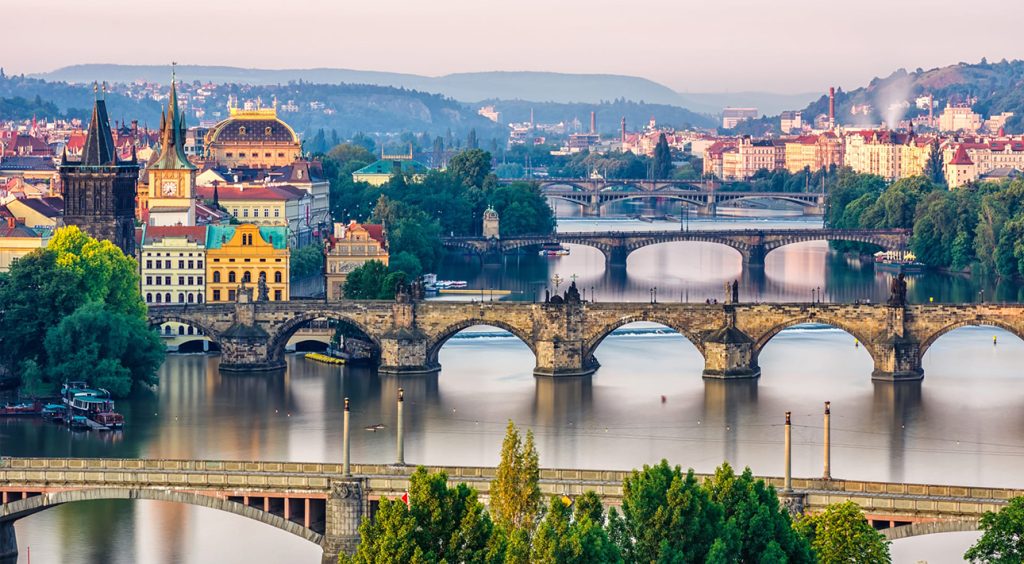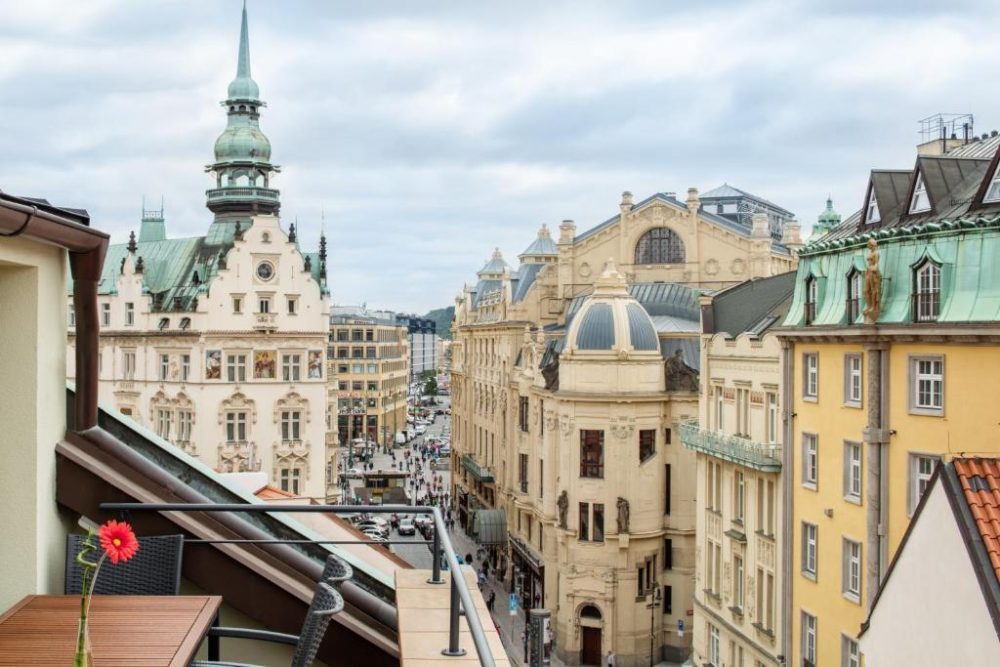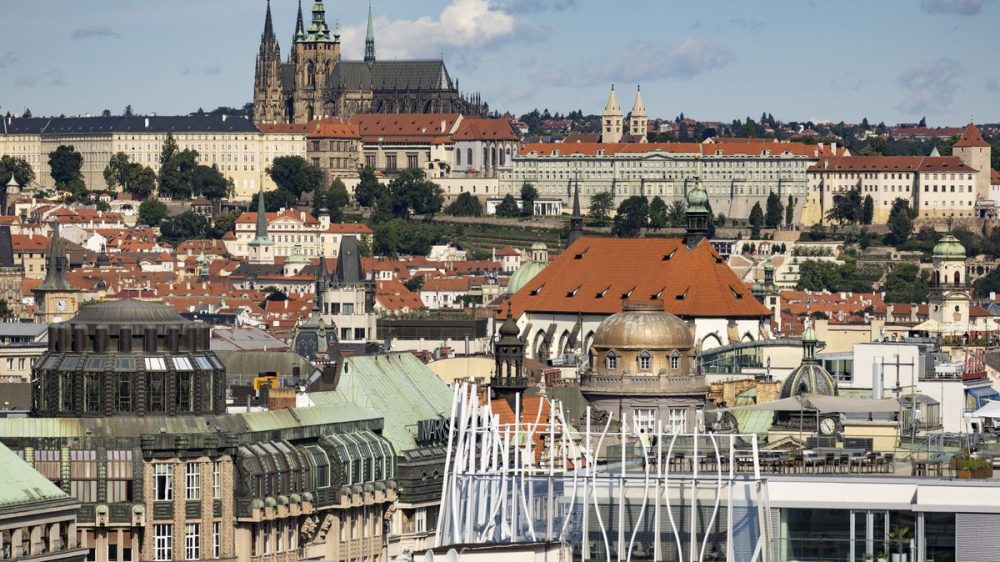In the Czech Republic, the cost per square metre is accompanied by legal transparency and home ownership provides stability. The country offers clear rules, protected rights and a clear tax system, making the process a solid investment strategy. The market has adapted to the new economic conditions, maintaining demand and simplified access for foreigners. With the right approach, the asset quickly starts to work – for income, status and future goals. In this article, we have prepared a detailed guide to buying property in the Czech Republic in 2025.
Housing market in the Czech Republic
In 2025, the housing market responded to foreign policy stability, domestic demand and global inflation. Property prices in the Czech Republic did not follow the scenario of its western neighbours: instead of falling, they stabilised. The average cost of a flat in Prague in February 2025 was $6,000 per m². For comparison: in Brno – $4000, in Olomouc – about $3000.
Foreigners have increased their demand: the purchase of property in the Czech Republic increased by 12.4% compared to 2023. Interest is concentrated in cities with universities and good transport logistics: Brno, Plzeň, Liberec.
Geography of interest: where to look so you don’t miss out
 Properties in the country offer more than just Prague. Three areas with growth potential have been identified for 2025:
Properties in the country offer more than just Prague. Three areas with growth potential have been identified for 2025:
- Plzeň – proximity to the border with Germany, active industrial cluster, average price $3,000 per m².
- Ceske Budejovice – historical architecture, tourist interest, price – about $3,000.
- Carlsbad – spa orientation, liquidity in rentals, home value – $208,000.
Each city forms its own rules and rhythm. Prague is for investment, regional centres are for living.
Guide to buying property in the Czech Republic: stages of the transaction and documents
The acquisition process is not complicated by bureaucracy, but it does require a clear adherence to order.
A guide with clear steps to buying a property in the Czech Republic will help you get it right. The investor needs to follow steps such as:
- Site Selection. Clarification of technical characteristics, legal cleanliness, presence of encumbrances.
- Reservation. Signing a deposit agreement (usually 2-5% of the price).
- Verification. Legal expertise, confirmation of ownership rights in the cadastre.
- Contract of sale. Signed by the parties, notarised if desired.
- Filing for registration. Introduction of changes to the cadastre. Term – up to 30 days.
- Final Calculation. Payment is made via a conditional deposit (notářská úschova).
- Handing over the keys. Fixing of the acceptance certificate.
Czech law does not require a purchase authorisation. A foreigner is entitled to buy a dwelling by observing the common law of ownership.
Financial maths: taxes, costs, investments
We have prepared a guide to buying property in the Czech Republic, detailing everything you need to know about taxes and hidden costs. Property purchase is exempt from VAT when buying from a private individual. But it is taxed when buying new buildings from a property developer (15%).

Tax base:
- Property tax (annual): $20 to $300 depending on location.
- Rental income: taxable (15%).
- Residents with a residence permit (VNZh) file a tax return according to the general rules.
Investments in the country’s housing stock remain relevant, with long-term rental yields of 3.8-4.5 per cent per annum. The market is focused on sustainability, not speculation.
Rights, obligations, restrictions
The Czech legal system protects the buyer. The ownership right arises after registration in the cadastre.
A guide to buying property in the Czech Republic that emphasises legitimate interests:
- the right to use, dispose of and transfer;
- the obligation to pay utilities and taxes;
- The obligation to maintain the property in a habitable condition;
- prohibition of independent modification of the facade in historic zones without approval.
How to buy property in the Czech Republic for a foreigner? You should comply with the law, use the services of an interpreter and a lawyer.
Living and owning: combining status and comfort
Immigration to the Czech Republic often starts with property. Acquisition of housing does not give automatic residence permit, but it strengthens the position when applying. Especially in the case of business immigration. Life in the Czech Republic gains stability through ownership.
The state supports the transparency of transactions. Registers are open, legal support is regulated. A guide to buying property in the Czech Republic, which opens the way to a safe and sustainable ownership system.
The nuances of registration and the cost of maintenance
The financial burden doesn’t end with the purchase. The cost of maintenance includes regular payments. A flat in Prague will require an average of 4,000-6,000 CZK per month for house maintenance, utilities and a repair fund. A private house – about $410, including heating, water, electricity.

Features include:
- compulsory registration of ownership;
- possible restrictions on the type of development in the protection zones;
- responsibilities to the HOA (e.g., attending meetings, voting on renovation issues);
- The need to insure the property in mortgage financing.
The country’s properties are characterised by moderate utility bills and high transparency in billing.
Barrier points: what hinders and what helps a foreigner
The purchase of property in the Czech Republic by foreigners is regulated at EU level. For non-EU citizens, additional attention to procedures is required, especially when obtaining financing. A foreigner can buy a home without restrictions, but will need:
- notarised translation of documents;
- Czech bank account;
- a trusted person or accredited agent when not in the country.
Banks are willing to lend to non-residents, but require a down payment of at least 30 per cent and proof of income. Registration of residence permit refers to the availability of housing as an additional factor of security.
When to buy and why now
The market has stabilised after rapid growth in 2021-2023. Prices have levelled off, demand for flats is growing slowly, and the volume of supply is 18% higher than a year ago.
For investors, this is an optimal time: price growth has slowed and rental interest remains high.
This article is a detailed guide to buying property in the Czech Republic. The way to a well-considered and long-term investment.
The country offers not just square metres, but a structured system where ownership is a transparency rather than a bureaucratic labyrinth.
Housing investments in 2025 are characterised by minimal risks and high predictability.
Simple legal procedures, protection of buyer’s rights, open cadastral data and a stable legal framework make the Czech Republic one of the most attractive countries in Europe for purchasing property.
Use our guide to buying property in the Czech Republic to make the right moves
 This article is a complete guide to buying property in the Czech Republic in 2025. It is a short but important path to a stable investment in a transparent and reliable legal system.
This article is a complete guide to buying property in the Czech Republic in 2025. It is a short but important path to a stable investment in a transparent and reliable legal system.
The country offers investors predictability, legal protection and minimal barriers to entry.
Here, square metres are not just an asset, but a tool for growth, status and comfortable living.
 en
en  ru
ru  de
de  ar
ar  es
es  nl
nl  hi
hi  fr
fr  it
it  pt
pt  el
el 









